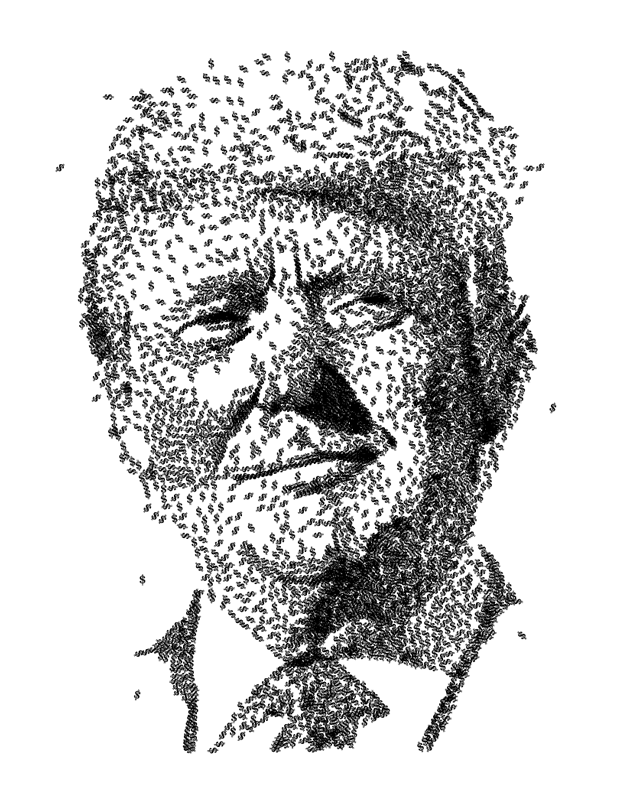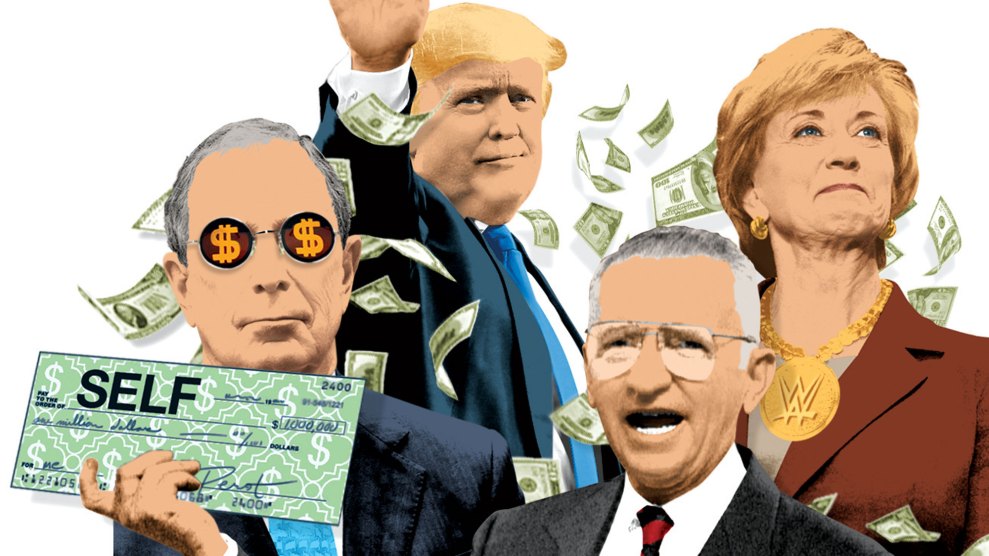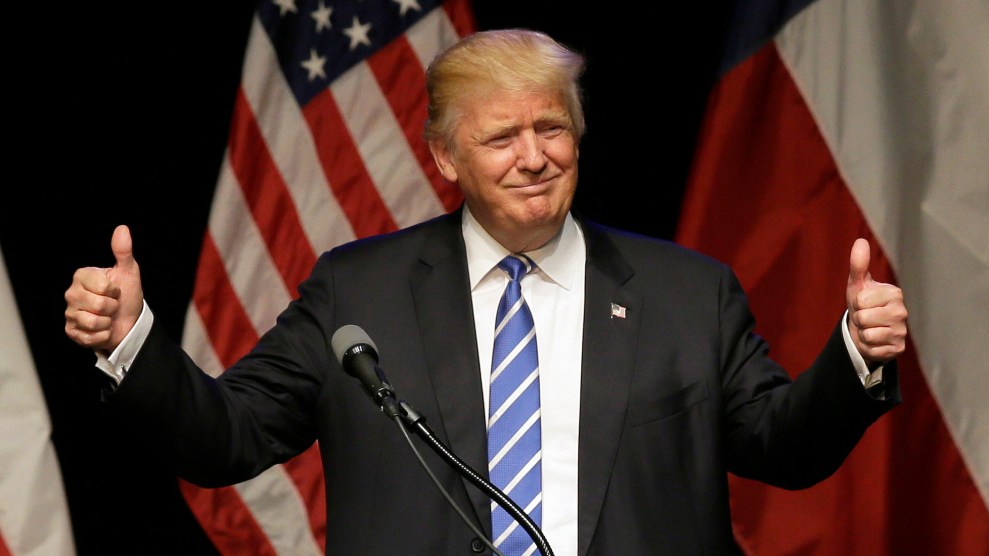
2016 was supposed to be the Dark Money Election, the year when a flood of anonymous campaign cash would dominate news cycles, the internet, and the airwaves, and pick our next president. In January 2015, the Koch brothers declared that their shadowy network of donors and political outfits would spend close to $1 billion. One analyst even predicted that the price tag for the entire election would come to $10 billion, the highest in US history.
Then, according to conventional wisdom, a superrich outsider blew all those predictions away. “In the end, Donald Trump defeated big money,” was how one postmortem put it. It’s true that Trump’s victory has changed what we thought we knew about politics. But does it change what we know about money in politics? Let’s look at the facts.
Trump began his bid for the presidency as a self-proclaimed foe of big donors and outside groups. He called for any super-PAC claiming to support him to be shut down. A longtime campaign donor himself, he convincingly criticized the nation’s “broken” campaign finance system and vowed to pump $100 million into his campaign to prevent the type of influence he once enjoyed with his own giving. “I will not be controlled by the donors, special interests and lobbyists who have corrupted our politics and politicians for far too long,” he said in October 2015. (That promise, like many others, went unfulfilled: The actual amount Trump spent on himself was closer to $66 million, to say nothing of the millions his campaign paid to his own businesses.)
By Election Day, however, it was clear Trump had run a largely conventional presidential campaign when it came to fundraising. He raised more than $300 million from wealthy givers and small-dollar donors, lobbyists and business executives—the usual suspects. He used those funds to pay a roster of consultants, pollsters, fundraisers, and ad makers, often in ways that obscured the purpose of the campaign’s spending. He ran lots of TV ads. Super-PACs and dark-money groups provided more than $100 million in unofficial support. And in the final week of the campaign, pro-Trump outside groups actually outspent groups supporting Hillary Clinton by a nearly 2-to-1 margin.
Clinton lost despite spending more than Trump, but he wouldn’t have won without raising truckloads of money just like any other candidate taking advantage of the “rigged” system. “In the presidential race, both major-party nominees ended up having lots of money,” says David Donnelly, president of the campaign finance reform group Every Voice. “At the top level, it’s not about having the most money, but about having enough to stay afloat.”
And dark money played a dramatically underappreciated role in key down-ballot races, the ones that ensured a Republican majority in both the House and Senate. Outside groups spent $1.4 billion in the 2016 cycle, about 40 percent beyond the already stratospheric levels of 2012. The Koch brothers and their network, for instance, sat out the presidential race but were reportedly on track to drop as much as $250 million almost entirely on congressional races, including $10 million to defend Sen. Pat Toomey of Pennsylvania and a nearly $1 million injection to save Wisconsin Sen. Ron Johnson from Russ Feingold, an advocate of campaign finance reform. Toomey and Johnson, considered two of the weakest GOP incumbents, both won close races.
A huge amount of this unfettered spending came in the final weeks of the campaign, when there was no chance voters would find out about it before they cast their ballots. In October, Senate Majority Leader Mitch McConnell helped raise a last-ditch $25 million for two groups affiliated with him, the Senate Leadership Fund and One Nation. Those groups’ money bombs, like the Kochs’, played a decisive role in multiple Senate races. So, too, did spending by the liberal nonprofit Majority Forward that benefited newly elected Sens. Catherine Cortez Masto in Nevada and Maggie Hassan in New Hampshire. It wasn’t immediately known where much of this last-minute infusion came from; in the case of the dark-money groups One Nation and Majority Forward, we will never know, since they’re not subject to even the limited disclosure rules that apply to super-PACs. But you can bet McConnell, Cortez Masto, and Hassan won’t forget. “On both sides you have instances where people are going to the Senate and they know who funded these groups but the public doesn’t,” says Robert Maguire, a researcher at the Center for Responsive Politics, which tracks election cash.
All the while, the nation’s political-money watchdogs have been in shambles. The Federal Election Commission is a “failure,” according to Ann Ravel, a commissioner and former chair. “Because of that,” she told me, “we see a campaign where all of the candidates…are thinking that there’s not a cop on the beat.” The IRS, which is supposed to keep tabs on dark-money groups, has seen its funding plummet by $900 million since 2010. One senior aide in Washington told me the agency is so pinched it can’t afford to replace broken clocks, much less duel with sophisticated political operatives and campaign lawyers. “With the Republicans in Congress basically disarming the IRS, they’ve made it safe for everybody” to push the limits of the law, says Marcus Owens, a lawyer and former director of the IRS division that oversees political nonprofits. “The Democratic Party is not going to go great lengths to disrupt that effort because they’re using it as well.”
Political money, in other words, is flowing freely in ways not seen since the pre-Watergate era. And there is little evidence to suggest President Trump has any interest in fixing the system. In his first days as the president-elect, he chose a top donor to lead his inauguration committee, stocked his transition team with corporate lobbyists, and floated several multimillionaire donors for Cabinet positions.
But perhaps none of Trump’s actions will mean more for the future of money in politics than his Supreme Court appointments. As president, he could have as many as three seats to fill on a court that is expected to hear major cases on questions like whether corporations should be able to pour cash into campaigns directly and whether the ban on so-called soft money should stand. Will he stick to his pledge to “drain the swamp“? For one signal of Trump’s intentions, consider that his inner circle includes none other than David Bossie, the man who launched the case that supercharged the dark-money era: Citizens United.

















